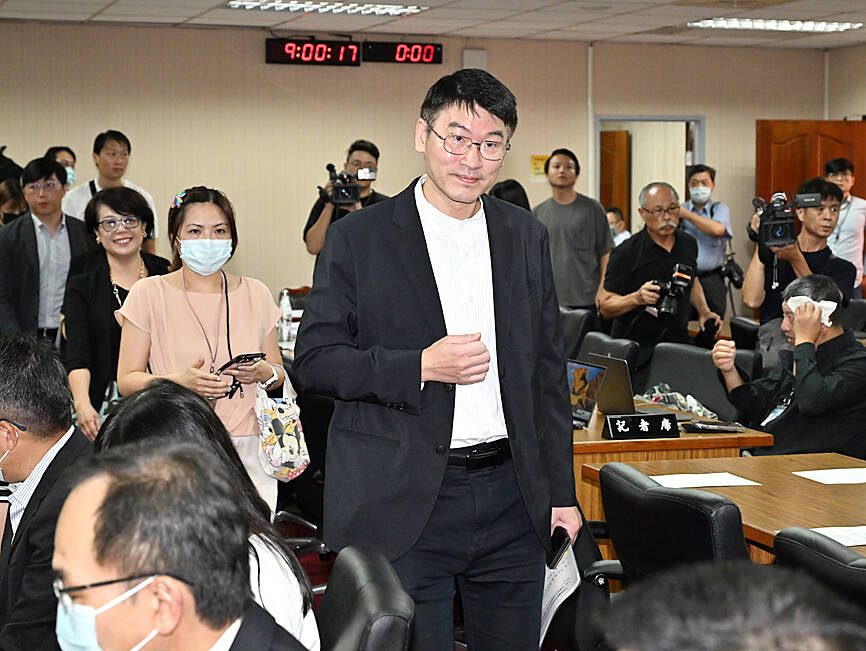The relationship between Taiwan and China is one of “two sides of the Taiwan Strait,” Mainland Affairs Council (MAC) Deputy Minister Liang Wen-chieh (梁文傑) said yesterday, adding that the media took comments he made earlier out of context by reporting that he called the two sides of the Taiwan Strait “two countries.”
Liang made the response to lawmakers following criticism over the comment he made during a radio interview on Monday last week in which he said the “two sides of the Taiwan Strait” and “the Republic of China (ROC) and People’s Republic of China (PRC)” mean the same thing.
In that comment, he was clarifying an earlier statement made by President William Lai (賴清德) that the ROC and PRC are not subordinate to each other.

Photo: Tien Yu-hua, Taipei Times
During a meeting of the Foreign Affairs and National Defense Committee at the Legislative Yuan yesterday, Taiwan People’s Party (TPP) Legislator Lin Yi-chuan (林憶君) asked Liang to clarify his comment that “two sides of the Strait” and “two countries” are the same, adding that it would be “ridiculous” to not treat the PRC like a country.
Liang said the radio interview was a discussion, and the media took his response out of context to make it “not quite accurate.”
When discussing the practical relationship between the two sides, Liang said he brought up the example of needing an ROC ID to qualify for National Health Insurance, so citizens of the PRC cannot apply.
The MAC was founded in accordance with the Act Governing Relations Between the People of the Taiwan Area and the Mainland Area (台灣地區與大陸地區人民關係條例), Liang said.
Therefore, “strictly speaking, it is necessary to talk about the relationship between the Taiwan area and the mainland area, but customary to say the ‘two sides of the Strait,’” he said.
TPP Legislator Chang Chi-kai (張啟楷) asked if this meant he would rescind his “two countries” comment in favor of “two sides of the Strait.”
Liang replied that it was “of course” two sides of the Strait, adding that the “two countries” comment was made by the host of the radio program, not him.
In the interview, the host said that according to the Constitution, it is “two sides of the Strait,” but practically, it is “two countries.”
Liang in response said that is “in essence how it is.”

Taiwanese can file complaints with the Tourism Administration to report travel agencies if their activities caused termination of a person’s citizenship, Mainland Affairs Council Minister Chiu Chui-cheng (邱垂正) said yesterday, after a podcaster highlighted a case in which a person’s citizenship was canceled for receiving a single-use Chinese passport to enter Russia. The council is aware of incidents in which people who signed up through Chinese travel agencies for tours of Russia were told they could obtain Russian visas and fast-track border clearance, Chiu told reporters on the sidelines of an event in Taipei. However, the travel agencies actually applied

New measures aimed at making Taiwan more attractive to foreign professionals came into effect this month, the National Development Council said yesterday. Among the changes, international students at Taiwanese universities would be able to work in Taiwan without a work permit in the two years after they graduate, explainer materials provided by the council said. In addition, foreign nationals who graduated from one of the world’s top 200 universities within the past five years can also apply for a two-year open work permit. Previously, those graduates would have needed to apply for a work permit using point-based criteria or have a Taiwanese company

The Shilin District Prosecutors’ Office yesterday indicted two Taiwanese and issued a wanted notice for Pete Liu (劉作虎), founder of Shenzhen-based smartphone manufacturer OnePlus Technology Co (萬普拉斯科技), for allegedly contravening the Act Governing Relations Between the People of the Taiwan Area and the Mainland Area (臺灣地區與大陸地區人民關係條例) by poaching 70 engineers in Taiwan. Liu allegedly traveled to Taiwan at the end of 2014 and met with a Taiwanese man surnamed Lin (林) to discuss establishing a mobile software research and development (R&D) team in Taiwan, prosecutors said. Without approval from the government, Lin, following Liu’s instructions, recruited more than 70 software

Chinese spouse and influencer Guan Guan’s (關關) residency permit has been revoked for repeatedly posting pro-China videos that threaten national security, the National Immigration Agency confirmed today. Guan Guan has said many controversial statements in her videos posted to Douyin (抖音), including “the red flag will soon be painted all over Taiwan” and “Taiwan is an inseparable part of China,” and expressing hope for expedited reunification. The agency last year received multiple reports alleging that Guan Guan had advocated for armed reunification. After verifying the reports, the agency last month issued a notice requiring her to appear and explain her actions. Guan